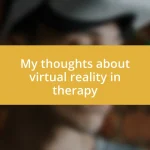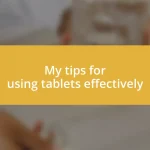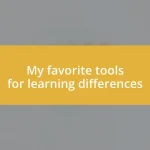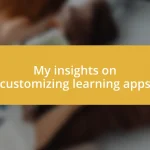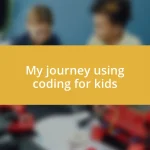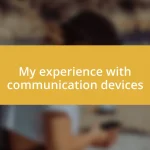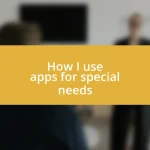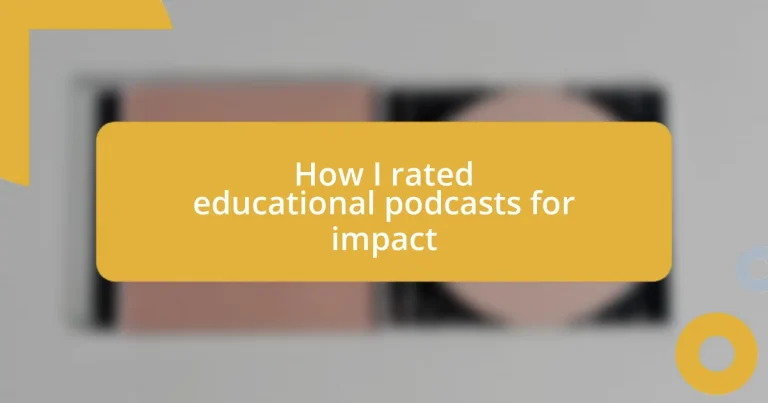Key takeaways:
- Educational podcasts enhance learning by providing accessible, versatile content that can be consumed while multitasking.
- Evaluating podcasts is vital, focusing on criteria such as content quality, presenter credibility, engagement, practical application, and diversity of perspectives.
- Audience engagement is crucial for impactful learning, facilitated through listener feedback, interactive elements, and captivating storytelling.
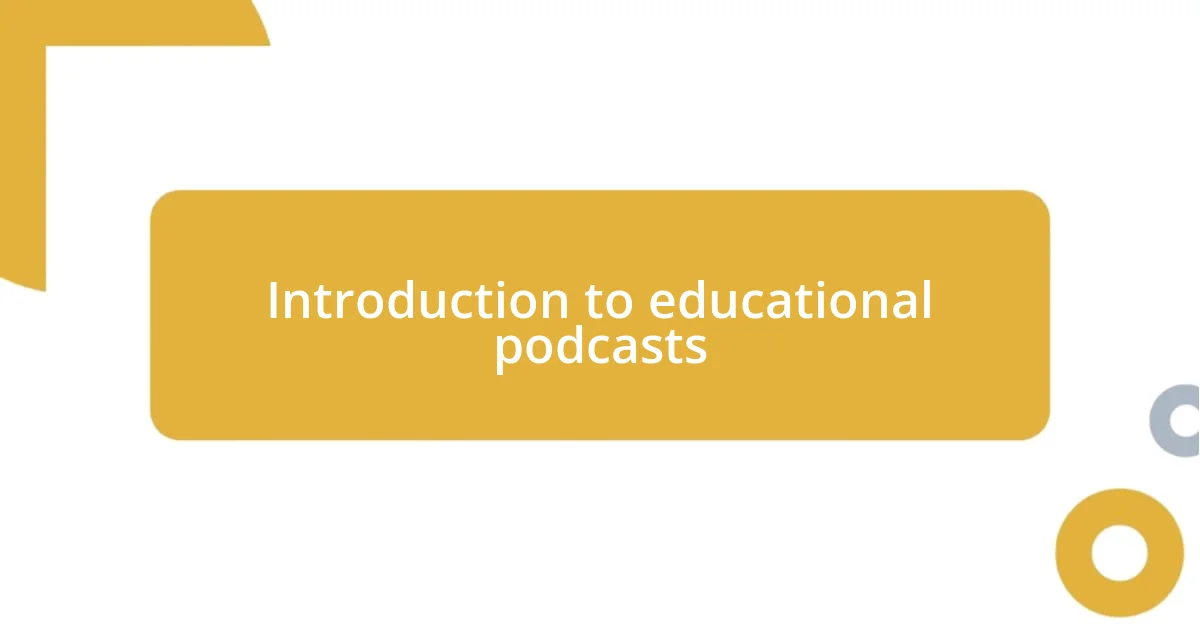
Introduction to educational podcasts
I remember the first time I stumbled upon an educational podcast during my morning commute. It was like discovering a hidden gem; the thoughtful conversations sparked ideas in my mind while the world hustled by outside. Isn’t it refreshing to think that learning can happen anywhere, even in the car or on a jog?
Educational podcasts have revolutionized how we access knowledge. They’re not just for students; they appeal to anyone with a curiosity to learn—from busy professionals to avid lifelong learners. Have you ever wondered how many fascinating topics you can explore while doing mundane tasks? I often find myself diving deep into subjects I never considered, all while multitasking.
The beauty of educational podcasts lies in their accessibility and versatility. They offer insights, expert opinions, and real-life examples that enhance our understanding of complex concepts. Personally, I appreciate how they break down intricate subjects into digestible bites, making learning feel effortless and enjoyable. It’s like having a personal tutor in your pocket, guiding you through an endless landscape of knowledge.
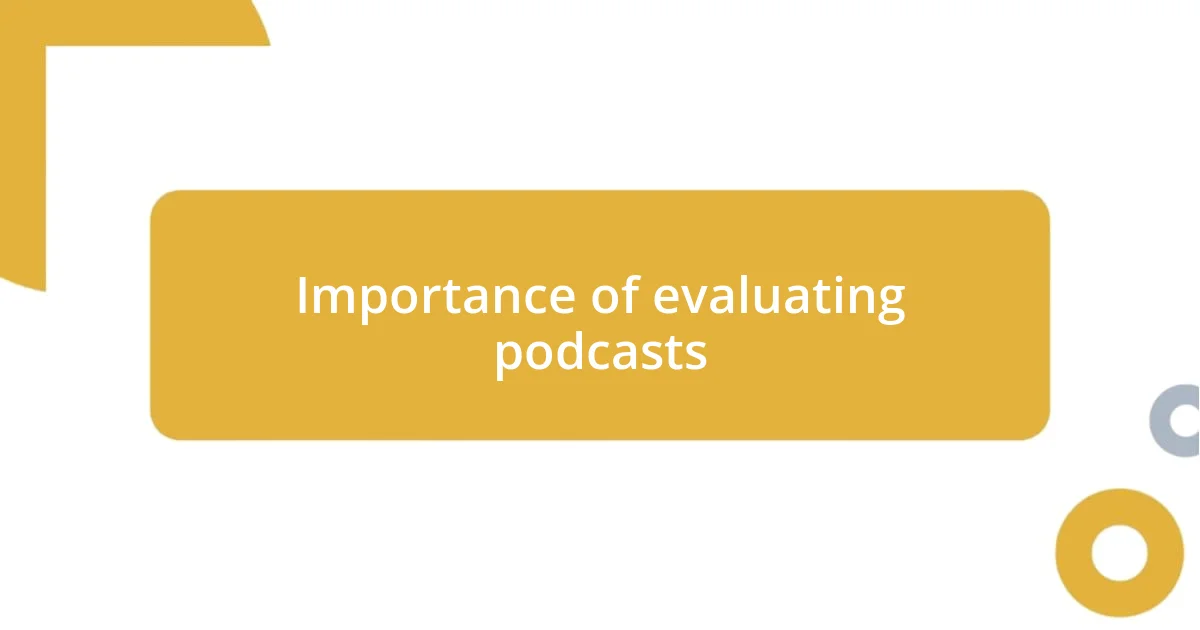
Importance of evaluating podcasts
Evaluating podcasts is crucial for ensuring that the content we consume is not only informative but also trustworthy. With so many options available, I often feel overwhelmed by choice, and that’s where a discerning approach comes into play. I remember dedicating an afternoon to sift through various educational podcasts, and it became clear that some provided depth, while others skimmed the surface.
Here’s what I consider important when evaluating podcasts:
- Content Quality: Is the information accurate, well-researched, and presented thoughtfully?
- Presenter Credibility: Are the hosts knowledgeable and experienced in their field?
- Engagement Factor: Does the podcast maintain my interest through storytelling or compelling discussions?
- Practical Application: Can I apply what I learn to real-life situations, enhancing my understanding or skill set?
- Diversity of Perspectives: Does the podcast offer varied viewpoints to provide a balanced understanding of the topic?
These elements not only shape my listening experience but also ensure that I’m engaging with ideas that truly resonate and enrich my knowledge. As I evaluate, I often ask myself whether I’m simply entertained or genuinely enlightened. This reflection keeps me focused on my learning journey.
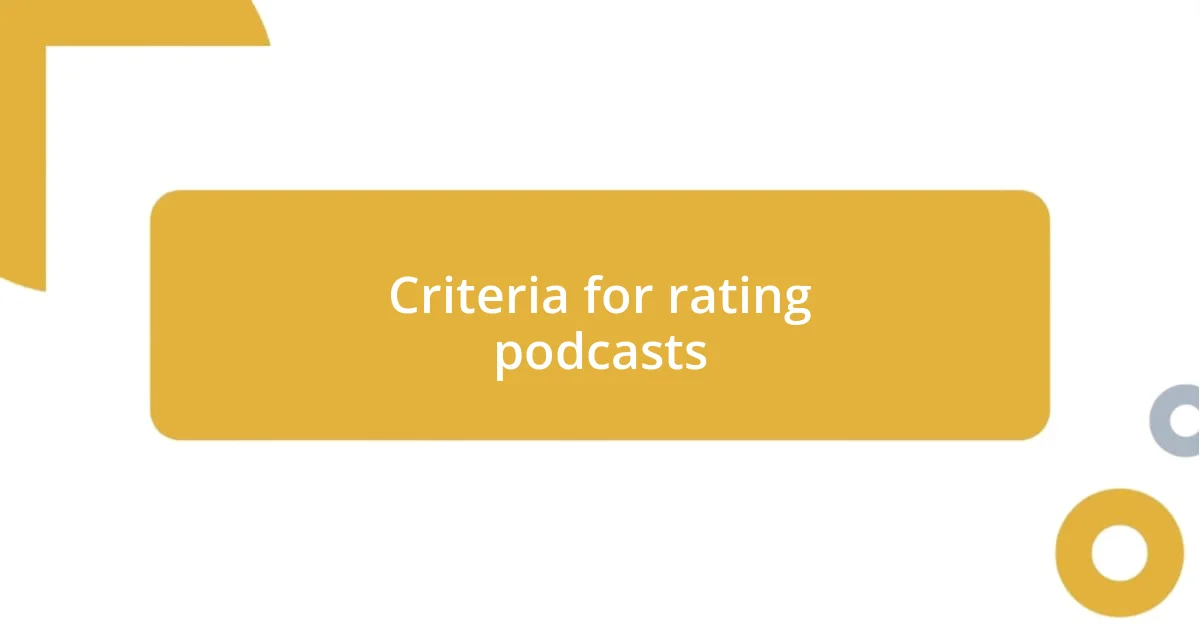
Criteria for rating podcasts
When rating educational podcasts, I focus on a few essential criteria that influence my overall experience. First and foremost, I consider the content quality. It’s crucial that the information presented is accurate and well-researched. I’ve encountered podcasts where the facts seemed questionable, which left me feeling frustrated—like being misled on a road trip. I couldn’t trust what I was hearing, and that’s a deal-breaker for me.
Another key factor I evaluate is the presenter’s credibility. A podcast hosted by someone who is genuinely passionate and knowledgeable can elevate the entire experience. For instance, I once listened to a podcast led by a seasoned educator who shared personal anecdotes and real-world applications, which made the content relatable and impactful. I found myself eagerly anticipating the next episode, nearly as excited as I would be for a friend’s story at dinner.
Finally, I look at how engaging the podcast is. If a podcast doesn’t hold my interest, I’ll quickly tune out. I remember feeling captivated by a podcast that used storytelling techniques to unpack complex topics. It was like listening to a gripping novel unfold, making the learning process not just informative, but downright enjoyable. This interaction between content and delivery ultimately determines how impactful the podcast becomes in my life.
| Criteria | Description |
|---|---|
| Content Quality | Accuracy and depth of information presented |
| Presenter Credibility | Knowledge and experience of the hosts |
| Engagement Factor | The ability to maintain listener interest |
| Practical Application | Relevance of ideas to real-life situations |
| Diversity of Perspectives | Variety in viewpoints to enhance understanding |
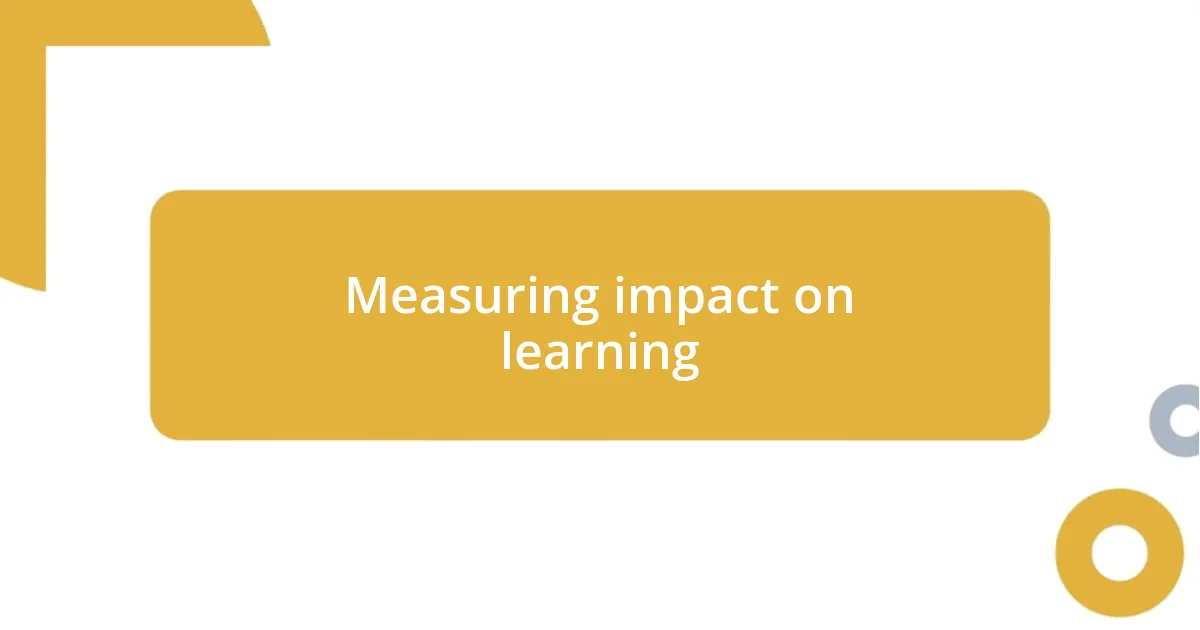
Measuring impact on learning
Measuring the impact on learning through educational podcasts can often feel subjective, but I’ve found that certain metrics can guide my evaluation. For example, after listening to a podcast episode on mental health, I took the time to implement the strategies it suggested. The shift in my perspective was tangible—I felt more equipped to handle stressful situations. It left me wondering: has a podcast ever changed your day-to-day decisions or habits?
Another aspect I consider is retention of knowledge. After diving into educational content, I like to reflect on what I’ve learned. I recall a time when I tackled a complex social issue through a series of thought-provoking podcasts. At first, the information felt overwhelming, but, over time, I could cite key points in discussions with friends. This not only reinforced my understanding but also made me feel confident when sharing insights. This leads me to ask, how often do you find yourself recalling podcast content in your conversations?
Lastly, feedback from other listeners can serve as a valuable measure of a podcast’s impact. I frequently engage with listeners in online forums after completing a series on entrepreneurship. The diversity of opinions and shared experiences often enhance my learning. I’ve witnessed firsthand how community interactions can deepen comprehension and inspire new ideas. Have you ever joined a discussion that illuminated something you thought you understood completely? These connections highlight the collaborative nature of learning in the podcasting realm.
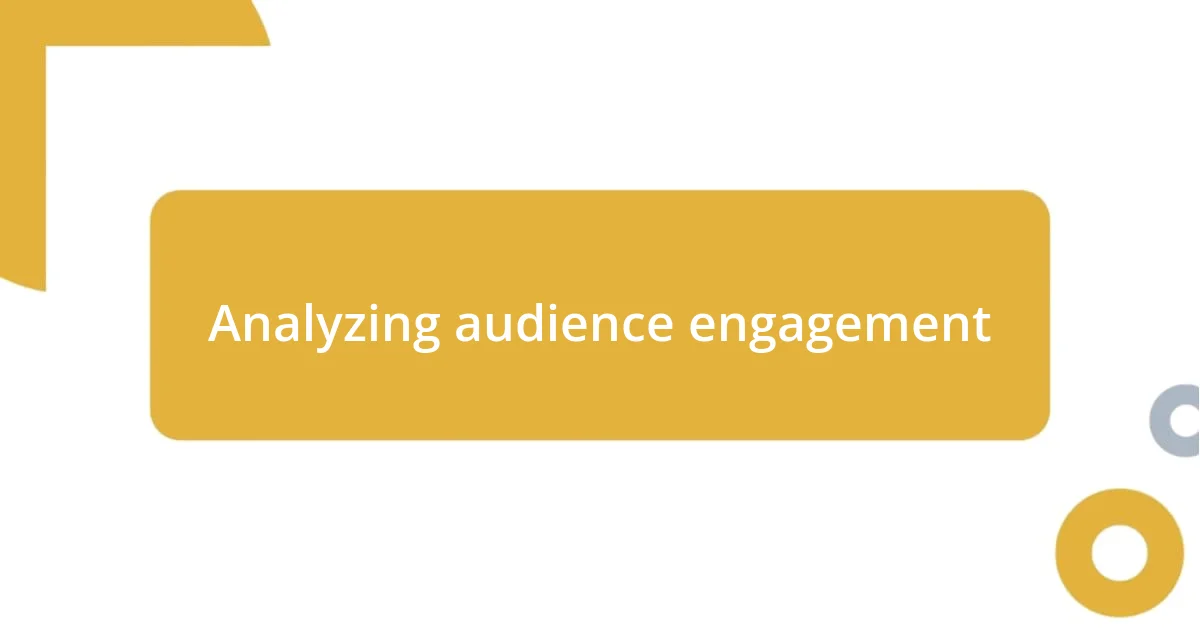
Analyzing audience engagement
Audience engagement is a critical aspect when evaluating educational podcasts. I can still recall a series I listened to that integrated live listener Q&A sessions, which made the experience feel interactive and alive. It felt like being part of a classroom discussion where I could connect the dots between my questions and the content being shared. Have you ever felt that rush when your thoughts are acknowledged in such a setting?
The use of listener feedback also plays a significant role in audience engagement. I once participated in a podcast’s feedback survey, and to my surprise, they incorporated my suggestions in the following episode. This made me feel valued and part of a community. That sense of belonging is powerful, don’t you think? It not only fosters loyalty but encourages listeners to share their experiences and insights, creating a richer learning environment.
Finally, the storytelling techniques employed by podcasters can dramatically affect how engaged I feel. I remember listening to a captivating story about a social entrepreneur who navigated obstacles in their journey. It drew me in like a page-turner and kept me on the edge of my seat. I found myself daydreaming about applying similar strategies to my own projects. Doesn’t it feel transformative when a story resonates with you at such a personal level? Engaging narratives unlock deeper connections and ensure I return for more episodes.
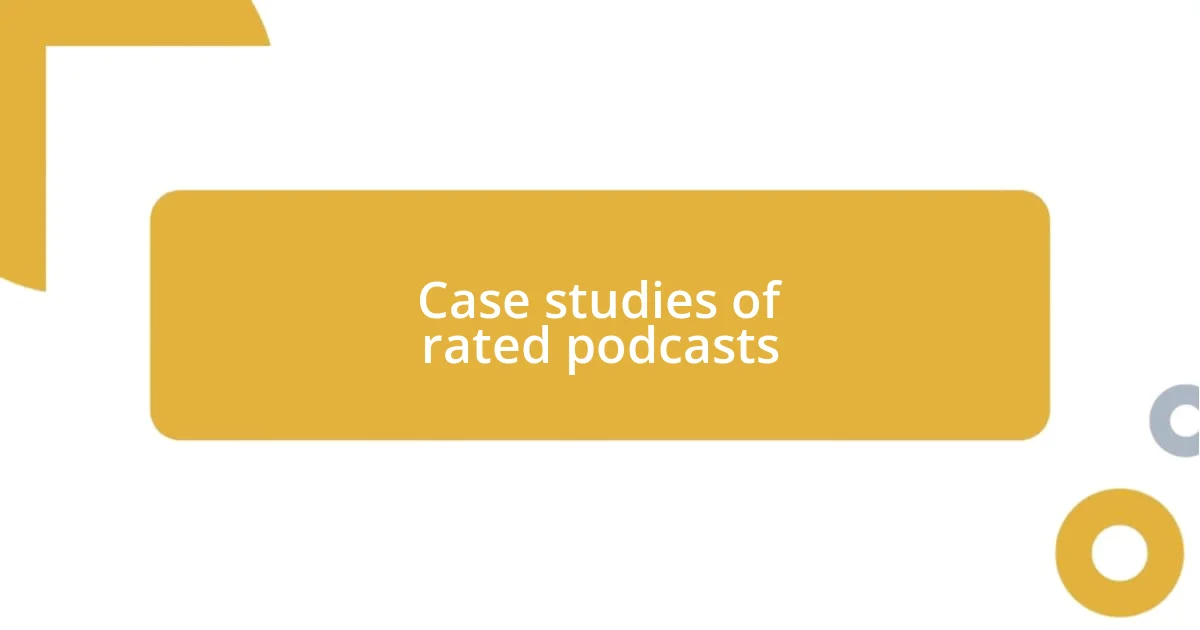
Case studies of rated podcasts
I remember tuning into a podcast that dissected the educational methods of a renowned teacher. The episode featured real-life case studies that demonstrated how innovative techniques had transformed struggling classrooms into environments of curiosity and engagement. After the episode, I felt inspired to integrate some of those ideas into my own teaching approach. Have you ever listened to a case study that motivated you to make real changes?
One podcast I rated highly shared success stories of students who thrived after engaging with interactive learning resources. The genuine excitement in their voices as they described their breakthroughs resonated with me. It was compelling to hear how specific strategies made tangible impacts in their academic lives. Reflecting on that, I’ve begun to appreciate how case studies can highlight not just theoretical concepts, but also the real-world application of learning.
In another example, a podcast examined community-driven educational initiatives. The stories of collaboration and shared purpose stirred emotions within me—seeing how collective effort could lead to powerful results was eye-opening. It left me pondering: how often do we recognize the strength in community-oriented learning? That powerful blend of personal stories and practical impact makes such podcasts invaluable in the education landscape.
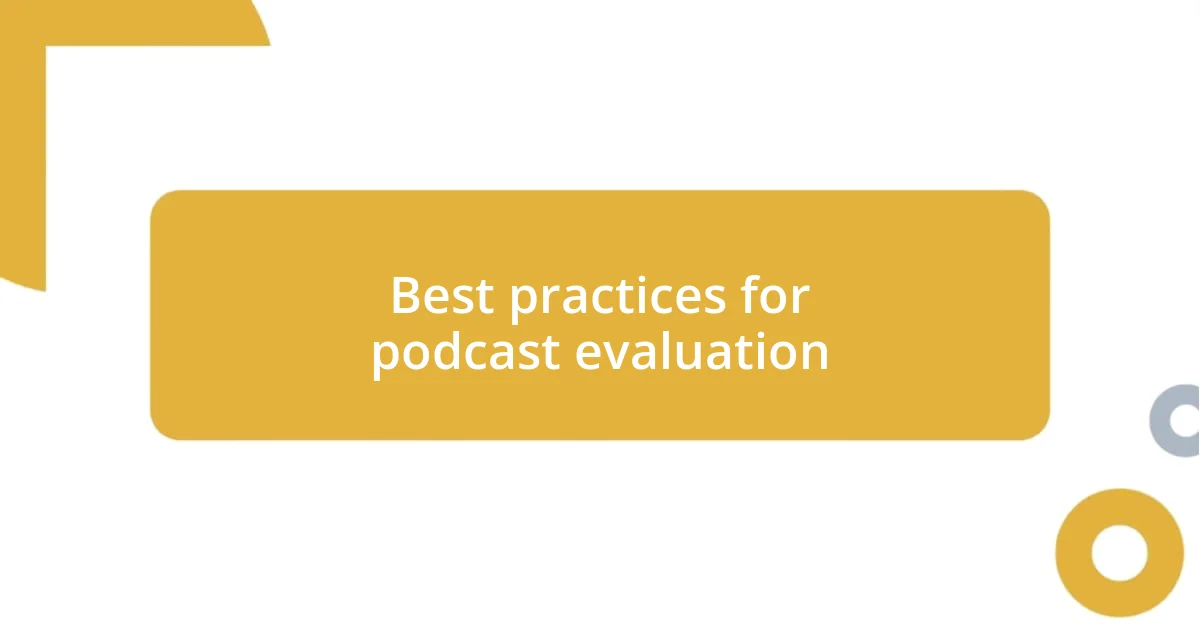
Best practices for podcast evaluation
Evaluating educational podcasts involves a few key best practices that I’ve learned through my own listening experiences. One important method is to look at the clarity of the content. For instance, I recall a podcast that tackled complex scientific topics but broke them down into digestible segments, which allowed me to truly grasp and retain the information. Have you encountered a podcast where the presenter’s clarity made all the difference in your understanding? When the message is clear, it not only enhances comprehension but also encourages exploration of further topics.
Another best practice in podcast evaluation is assessing the relevance and applicability of the content to your needs. I often find myself connecting more strongly to episodes that provide actionable tips. In one episode, a host shared strategies specifically for remote learning, which were incredibly timely for me. Those practical takeaways left me motivated and eager to apply what I’d learned in my own routine. It’s a fulfilling moment when I can see the direct impact of a podcast on my life, isn’t it?
Lastly, I believe it’s crucial to consider the host’s passion and expertise. I once listened to a series led by an educator whose enthusiasm was palpable; it made the subject matter feel vibrant and engaging. When hosts share their genuine love for a topic, it ignites a spark in the listeners. Isn’t it inspiring when someone’s passion for what they do translates into the content they create? That enthusiasm often resonates, making educational podcasts not just informative but truly enjoyable.




